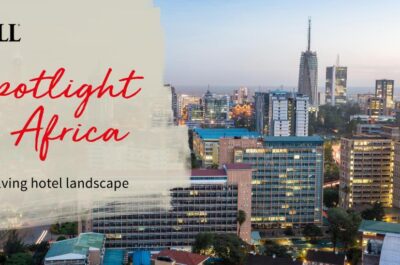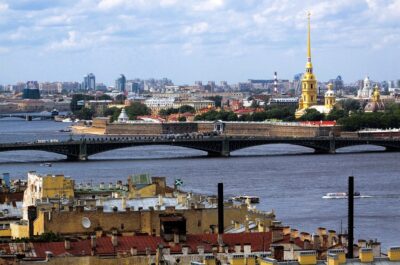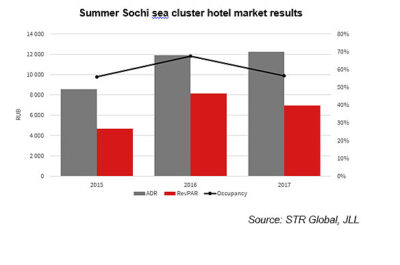For the first eight months of 2015 the occupancy for the sea cluster was 42%, while the period from June to August delivered a strong growth in occupancy, bringing it to over 54%. ADR for the same period was RUB 6,900 compared to RUB 8,500 for summer.
MOSCOW – Tatiana Veller, Head of JLL Hotels & Hospitality Group, Russia & CIS, comments on operational performance of branded hotels in Sochi:
“The results of Sochi and Krasnaya Polyana hotels for the reported period of 2015 show that Russian tourists are gradually getting used to domestic destinations, which proves the high potential of Sochi hotel market. Noteworthy is the fact that the positive growth was characteristic of both mountain and sea cluster hotels.
For the first eight months of 2015 the occupancy for the sea cluster was 42%, while the period from June to August delivered a strong growth in occupancy, bringing it to over 54%. ADR for the same period was RUB 6,900 compared to RUB 8,500 for summer. August was the most successful month for the sea cluster with occupancy close to 65% and ADR of RUB 9,300. For comparison, in August 2014 the occupancy was 56% with average rate sitting at RUB 4,800.
As a result, RevPAR for hotels in the Non-Mountain cluster exceeded RUB 4,600 in the summer months and RUB 3,000 for the period from January to August. Sochi hoteliers are starting to operate their hotels more efficiently, using the high season to maximize profitability for the whole year.
Although mountain cluster hotels managed to grow occupancy in the period from January to July , this growth came at an expense of lowering the average rate. Fading post-Olympic enthusiasm about the destination, together with supply (though moderate) gradually entering the market, contributed to the existing situation. For the first seven months of 2015 average occupancy for the mountain cluster hotels reached 39% against 28% for the corresponding period in 2014. Occupancy in January-February sat at 65% (55% in 2014), while in June-July it only reached 25% (but still was twice higher than in 2014 (11%)).
At the same time, ADR in the mountain cluster fell by 9% during the seven-month period from January to July2 (compared with the same period in 2014) to RUB 4,900. As could be expected, the highest rate in hotels with mainly winter demand was registered in January and February (RUB 7,200), while in June-July it dropped to RUB 3,000. August may have changed the situation for the better – last year the last summer month saw a 30% growth of occupancy compared to July.
Due to the year-over-year growth of occupancy compared to 2014, hotels of Krasnaya Polyana in January-July enjoyed a sizeable RevPAR increase of 37%, to RUB 2,100.
No doubt, that this year Sochi hotel market in general benefitted from the current exchange rate – with abroad destinations becoming more expensive in ruble terms, and an increasingly complex visa regime, tourists opted for travel inside Russia. However, the market is still very far from being mature. For example, annual occupancy in popular Egyptian resorts (Sharm El Sheikh and Hurghada), year to date exceeds 61%, thus enabling hotels to operate effectively all year round.
Sochi has unique potential – a mix of mountain and beach activities in one destination creates an opportunity for an “ideal resort” location with minimum seasonal fluctuations for the market in general. Opposite seasons in peaks and valleys in performance of the Greater Sochi and Krasnaya Polyana hotels allow smoothing out the overall demand curve, which should enable hotel owners and operators, if they had properties in both sub-markets, to operate an efficient and profitable business there.
At the same time, the observed dynamic of Sochi hotel market development proves the fact that its touristic potential can only be fully realized with targeted government support. Organic seasonal demand needs to be supplemented by MICE and corporate segments in low season, and that would eventually enhance the performance of Sochi hotels.”
Vicky is the co-founder of TravelDailyNews Media Network where she is the Editor-in Chief. She is also responsible for the daily operation and the financial policy. She holds a Bachelor's degree in Tourism Business Administration from the Technical University of Athens and a Master in Business Administration (MBA) from the University of Wales.
She has many years of both academic and industrial experience within the travel industry. She has written/edited numerous articles in various tourism magazines.





























































































































































































